Have you ever wondered if deer eat fruit? While we often think of deer as grazing on grass and shrubs, they do have a taste for certain types of fruit. From juicy apples to sweet cherries, several fruits are appealing to deer.
But why do deer eat fruit, and what nutritional benefits do they provide? And what are some of the risks associated with deer consuming fruits? In this article, we’ll explore the evidence on deer and fruit consumption, drawing on scientific research and expert insights to provide a comprehensive overview of this topic.

In the United States, the white-tailed deer is the most common species and is found in most regions of the country. They have a unique digestive system that allows them to extract nutrients from plant materials, which is why they are well adapted to survive on a diet of vegetation.
Currently, the white-tailed deer population in the United States is estimated to be around 30 million. This population is managed by state wildlife agencies through hunting and other management techniques to maintain a healthy and sustainable population.
Whether you’re a nature enthusiast, a farmer, or simply curious about the eating habits of these graceful animals, read on to discover everything you need to know about deer and fruit.
Note:- It’s important to remember that feeding deer or any other wild animal is generally discouraged, as it can lead to habituation to humans and potential health problems for the animal. Therefore, it’s best to leave the feeding of deer to their natural diet and habitat.
Do Deer Eat Apples?
Yes, deer do eat apples. Apples are a sweet and nutritious fruit that deer find palatable and are known to be one of their favorite foods. If there are apple trees or orchards in their habitat, deer will browse the fruit during the fall season when they are ripe.
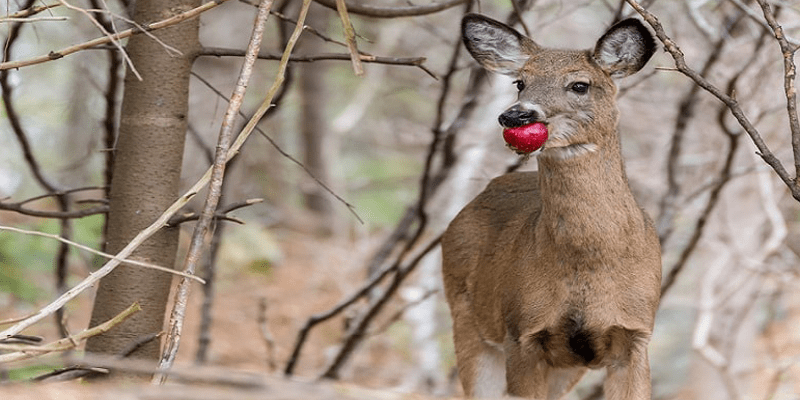
In fact, apple orchards are often popular spots for deer, especially during the fall hunting season. Some hunters even use apples as bait to attract deer to a specific area. However, it’s important to note that it’s illegal to bait deer in some states, so it’s important to check with local wildlife regulations before using apples or any other bait to attract deer.
Is Apple Good For Deer?
Yes, apples are a good food source for deer. Apples are nutritious fruit that contains sugar, carbohydrates, and fiber, which can provide deer with the energy and nutrients they need to survive. Apples are also high in water content, which can help deer stay hydrated when water sources are scarce.
While deer do enjoy apples, it’s important to avoid feeding them apples or any other human food, as it can lead to habituation to humans and potential health problems for the deer. Additionally, it’s important to maintain a safe distance from deer when observing them in the wild, as they are wild animals and can be unpredictable.
When deer like to eat apples the most depends on the region and the specific apple variety. In general, deer will eat apples when they are ripe and available in their habitat. In many areas of the United States, apples ripen in the fall, which coincides with the deer breeding season, also known as the rut. During this time, deer are particularly active and may consume more food to build up their energy reserves for the breeding season.
How Many Apples Can A Deer Eat?

The number of apples a medium-sized adult male deer can consume per day can vary based on several factors, such as the size and nutritional content of the apples, the availability of other food sources, and the size and appetite of the deer.
In general, an adult deer can eat up to 6-8 pounds of food per day, including a variety of plant materials such as leaves, twigs, and bark.
If apples are offered as part of their diet, an adult deer can consume around 1-2 pounds of apples per day. This could be equivalent to roughly 6-10 medium-sized apples per day, depending on the size and nutritional content of the apples.
What Kind Of Apples Do Deer Like?
In general, deer tend to prefer apples that are sweeter and have higher sugar content. Some of the most popular apple varieties that deer are known to like include:
- Honeycrisp
- Red Delicious
- Golden Delicious
- Gala
- Fuji
It is difficult to determine which specific apple varieties are most liked by deer, as their preferences can vary based on individual taste and the availability of other food sources.
Do Deer Eat Bananas?
Yes, deer have been known to consume bananas if they are available and easily accessible. There is limited scientific research on deer and banana consumption. According to Harvard edu, evidence suggests that deer may be attracted to the scent of ripe bananas and may eat them if they come across them. Bananas are a source of carbohydrates and potassium, which can be beneficial to deer, especially during the winter months when food sources are limited.
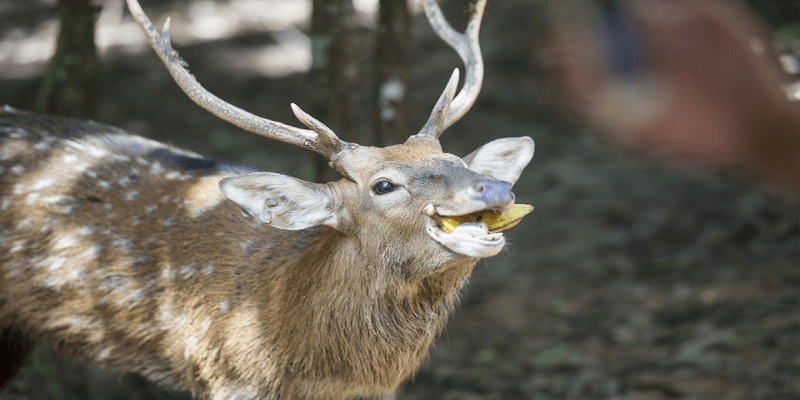
In conclusion, while deer may eat bananas if they come across them, it is not recommended to intentionally feed them or any other human food. It is best to allow deer to forage for their food in their natural habitat and to avoid interfering with their natural behaviors and instincts.
Is Banana Good For Deer?
There is limited scientific research on why deer may be attracted to bananas, but it is believed that the scent of ripe bananas may be appealing to them. Bananas can provide some nutritional benefits for deer, but they should not be a significant part of their diet. While bananas are a source of carbohydrates and potassium, they are not a natural food source for deer and should be considered a supplemental food source rather than a staple.
Do Deer Eat Banana Peels In Detail?
While deer have been known to eat bananas and even banana peels on occasion, it is not a common or reliable food source for them. Banana peels, in particular, are not a natural part of their diet and can be difficult for them to digest, leading to digestive issues or other health problems.
Do Deer Eat Banana Leaves?
Deer are primarily herbivorous animals that feed on a variety of plant materials, including leaves, twigs, and bark. While banana leaves are not a natural part of their diet, deer may eat them if they are hungry and no other food sources are available. However, it is not a preferred food for deer and they are more likely to feed on other vegetation in their natural habitat.
Do Deer Eat Pears?
Yes, deer may eat pears in the woods if pear trees are present. Pears are a type of fruit that is commonly found in orchards, gardens, and parks, but they can also grow in the wild. In the United States, pear trees are found in many regions and are a common food source for deer in areas where they grow naturally.
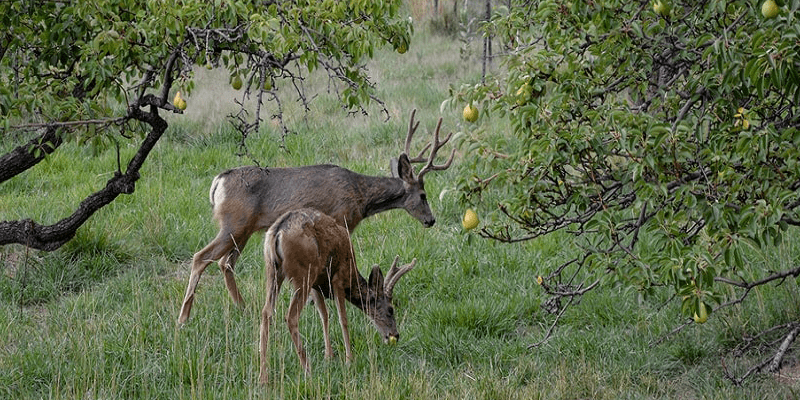
Pears provide a variety of nutrients, including vitamins C and K, fiber, and potassium, which can be beneficial for deer. During the late summer and fall when pears are in season, deer will often feed on them as they store up food for the winter months.
What Is Kieffer Pear Tree?
Deer are known to eat pears, including those from Kieffer pear trees. The Kieffer pear tree is a variety of pear tree that is commonly grown in the United States. It is a hardy, disease-resistant tree that produces large, sweet pears that are often used for canning and baking.

The Kieffer pear tree was developed by Peter Kieffer, a farmer from Louisiana, in the mid-19th century by crossbreeding a Chinese sand pear with a European pear. Today, Kieffer pear trees are widely grown in many regions of the United States, including the Southeast, Midwest, and Northeast.
Will Deer Eat Rotten Pears?
Yes, deer will eat rotten pears, but it is not a preferred food source for them. However, rotten fruit can be a sign of decay and spoilage, which may affect the nutritional quality of the fruit and potentially cause health issues for the deer.
While deer may eat rotten pears, it is not a common occurrence. The fermentation process that takes place as the pear decays can cause a buildup of alcohol, which can be harmful to deer and other animals if consumed in large quantities. As a result, deer may avoid the pears or only eat them in small amounts.
Do Deer Eat Watermelon?
Yes, deer are known to eat watermelon, particularly during the late summer when watermelons are in season. Watermelon is a good source of hydration and nutrients for deer, including vitamins A and C, potassium, and magnesium.
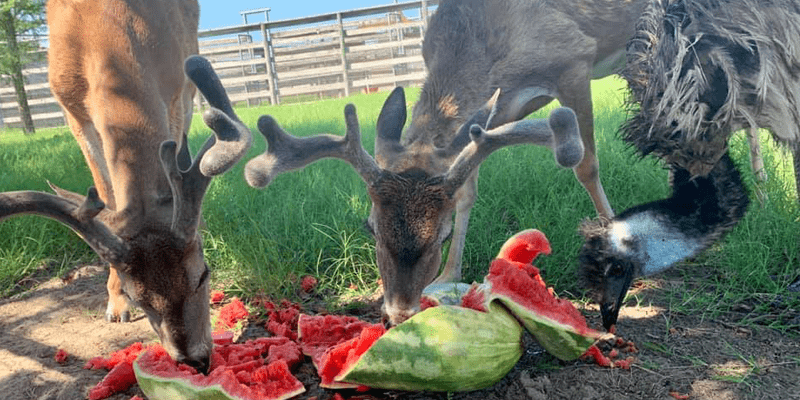
Watermelon is a particularly attractive food source for deer because it is high in sugar and moisture, making it a good source of energy and hydration. In areas where watermelon is abundant, deer will often seek it out and consume it as part of their natural diet.
Do Deer Eat Watermelon Seeds?
Yes, deer can eat watermelon seeds along with the flesh of the fruit. Watermelon seeds are a good source of protein, fiber, and other nutrients for deer, and they may consume them if they come across a ripe watermelon in their natural habitat.
However, it is important to note that watermelon seeds, like all seeds, are not the primary food source for deer and should not be relied upon as a significant source of nutrition.
Additionally, while watermelon seeds are not toxic to deer, it is possible that they could cause digestive issues if consumed in large quantities. Therefore, it is generally recommended to only offer watermelon flesh to deer and not the seeds.
Do Deer Eat Watermelon Rind?
The answer is yes but it may not be a typical food for deer, it seems that they have developed a taste for these fruits. let me tell you a recent story about it.
There is a doe with 3 fawns who visit daily for watermelon rinds. The doe, who is called “Honey”, comes as close as 2 feet away from the property owners and appears to enjoy the rinds. The property owners are happy to provide the watermelon rinds to Honey as she appears thin after giving birth to her 3 fawns and they hope it helps to keep her hydrated and provides some extra nutrition for her and her fawns. In addition to watermelon rinds, the deer on the property have also eaten broken-up pumpkins in November.
Do Deer Eat Grapes?
Yes, deer do eat grapes and are attracted to them due to their high sugar content. Grapes are also a good source of carbohydrates and fiber, which are important nutrients for deer.
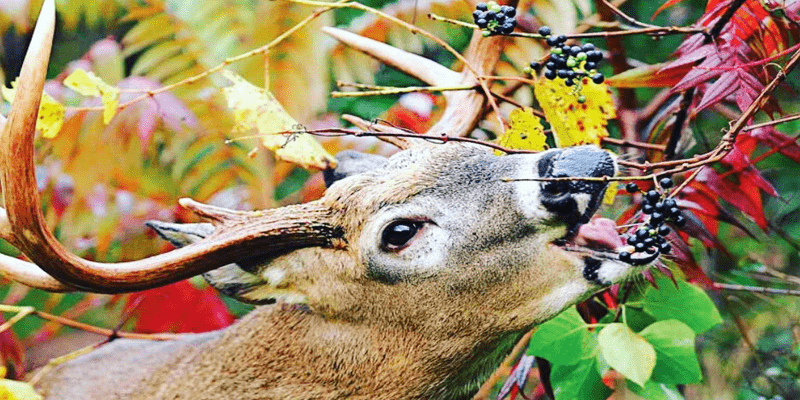
This can happen in vineyards, orchards, or even in backyard gardens where grapes are grown. In some cases, deer may also cause damage to grape crops, as they may eat the fruit or damage the vines while foraging. This can lead to economic losses for farmers and gardeners.
Can Deer Smell Grapes?
Yes, deer have a very keen sense of smell and can detect the scent of grapes from a distance. Their sense of smell is estimated to be about 1,000 times more powerful than that of humans. When grapes begin to ripen and produce a strong aroma, deer can easily detect it and may be attracted to the vineyard or garden where the grapes are growing. This is one reason why grape growers often have to take measures to protect their crops from deer damage.
How To Keep Deer Away From Grape Vines?
Here are some methods to keep deer away from grape vines:
- Use physical barriers such as deer fencing or netting around the grape vines.
- Install motion-activated sprinklers or lights to startle the deer and deter them from approaching the grape vines.
- Apply deer repellents or use natural deterrents such as predator urine, human hair, or soap bars around the grape vines.
- Plant deer-resistant plants around the grape vines to discourage deer from entering the area.
- Harvest grapes as soon as they are ripe to prevent attracting deer with the scent and sweetness of the fruit.
Do Deer Eat Oranges?
Deer are known to eat a wide variety of plant materials, including fruits such as oranges. However, oranges are not a typical food for deer in the wild and are not a significant part of their diet.
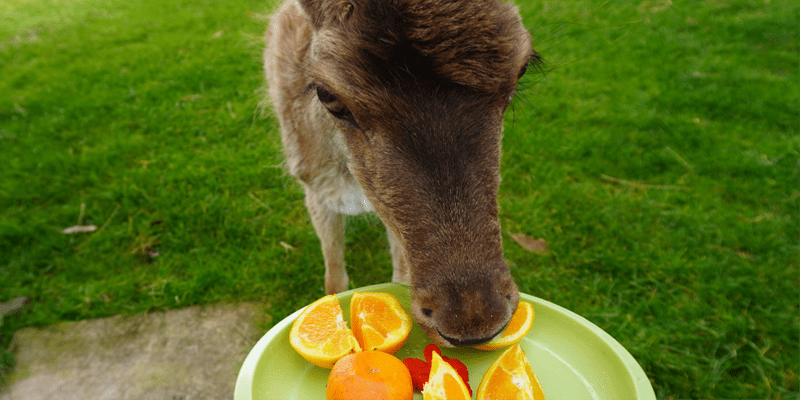
In areas where oranges are grown, such as in Florida and California, deer have been known to eat fallen fruit or fruit that has been left on the ground.
Additionally, oranges have a high sugar content, which can cause digestive issues for deer if consumed in large quantities.
Will Deer Eat Orange Peels?
Deer have been known to eat orange peels, but it is not a preferred food source for them. Orange peels contain a compound called limonene, which gives them a bitter taste and odor that deer find unappealing. However, if food is scarce or if a deer is particularly hungry, it may resort to eating orange peels.
Do Deer Eat Pineapple?
While deer can eat a wide variety of plants and fruits, there is no definitive evidence that deer eat pineapple.
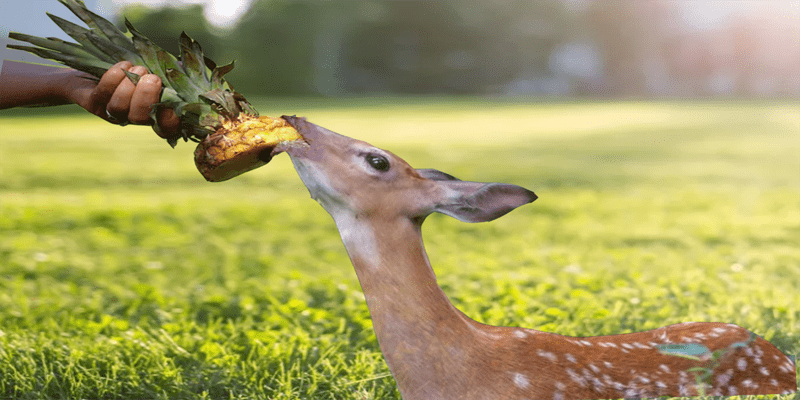
Pineapple is not a native plant in the natural habitats of deer, and it is not commonly found in the wild. Pineapple is also not typically grown as a crop in areas where deer are found. Therefore, it is unlikely that deer encounter pineapple in their natural environment.
If you are considering feeding deer pineapple, it is important to ensure that the pineapple is fresh and ripe and that it is cut into small pieces that are easy for deer to consume.
Can Deer Eat Pineapple Rinds?
I could not find any reliable sources that definitively state whether or not deer can eat pineapple rinds. According to PennState reports of deer eating various types of fruits, including pineapples, there is limited scientific research on the topic, and it is not clear whether deer would eat the tough and fibrous rinds of pineapples.
Do Deer Eat Berries?
Yes, deer are known to eat berries, including but not limited to strawberries. They have a varied diet and will consume many types of fruits and berries that are available to them. Some of the other berries that deer may eat include blueberries, raspberries, blackberries, and elderberries.

Deer are attracted to the sweet scent and taste of ripe berries, which are high in sugar and other nutrients. They have an acute sense of smell, which makes it easy for them to locate ripe berries in the wild.
If you have berry plants in an area where deer are present, they may eat the berries if they are not protected. To protect your berry plants from deer damage, you can use the same methods that are effective for protecting strawberry plants, such as installing fencing, using repellents, companion planting, netting, and scare tactics.
Overall, while deer are known to eat berries, there are steps you can take to protect your berry plants from being consumed by these animals.
Types Of Berries That Deers Eat?
There are several types of berries that deer may eat, including:
- Strawberries: As we’ve discussed earlier, strawberries are a favorite food of deer and are often targeted by these animals.

- Blueberries: Blueberries are another common berry that deer will eat. These fruits are high in nutrients and have a sweet taste that deer find appealing.

- Raspberries: Raspberries are also a favorite of deer. These berries are known for their bright red color and sweet flavor.

- Blackberries: Blackberries are a type of berry that deer will eat if they are available. These fruits are high in sugar and have a sweet, tart taste.

- Elderberries: Elderberries are another type of berry that deer may eat. These dark purple berries are high in antioxidants and have a slightly bitter taste.

- Mulberries: Mulberries are a type of berry that is native to North America and are commonly eaten by deer. These fruits are high in sugar and have a sweet, juicy flavor.

- Huckleberries: Huckleberries are a type of berry that is found in the western United States and are often eaten by deer. These fruits have a tart flavor and are high in antioxidants.

Overall, deer have a varied diet and will eat many types of berries that are available to them. If you have berry plants in an area where deer are present, it is important to take steps to protect them from being consumed by these animals.
Do Deer Eat Strawberries?
Yes, according to me, deer are known to eat strawberries. Strawberries are particularly vulnerable to deer damage because they grow close to the ground and are often unprotected.
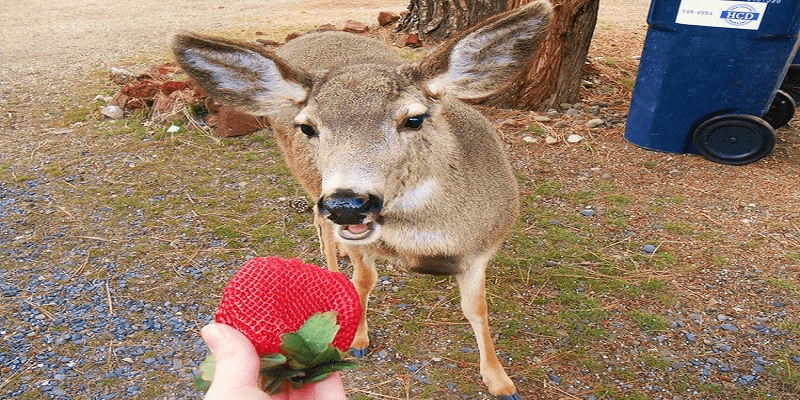
Additionally, deer have a keen sense of smell, which makes it easy for them to locate ripe strawberries. Therefore, if you have strawberry plants in an area where deer are present, the deer may eat the strawberries if they are not protected.
How To Keep Deer Away From Strawberries?
Sure, here’s a summary of the methods for keeping deer away from strawberries:
- Fencing: Install a tall fence (at least 8 feet) around your strawberry patch.
- Repellents: Use deer-repellent sprays or granules with strong scents or flavors.
- Companion Planting: Plant herbs or other plants that deer are less likely to eat near your strawberries.
- Netting: Cover your strawberry plants with netting to protect them from deer.
- Scare Tactics: Use loud noises or flashing lights to scare deer away from your garden.
Do Deer Eat Cherries?
Yes, deer are known to eat cherries. Cherries are a type of fruit that grows on trees and are often harvested by humans for consumption. However, they can also be a food source for wildlife such as deer.
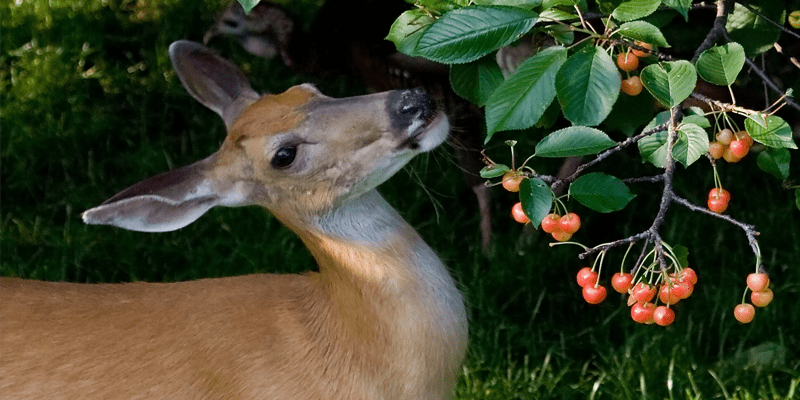
Deer are known to have a sweet tooth and may be attracted to fruit trees such as cherry trees. They may eat cherries that have fallen on the ground or reach up to eat them directly from the tree. Cherries are considered a high-risk crop for farmers in areas with high deer populations.
Do Deer Eat Cherries With Pits?
Deer are known to eat the fruit of the cherry tree, including the flesh and skin, but they typically do not eat the pits. The pits, also known as stones, are hard and indigestible and can cause digestive issues if consumed.
Deer typically eat the soft, fleshy part of the cherry and spit out the pit. They may consume a small amount of the pit while eating the fruit, but they do not typically eat the pit in its entirety.
It’s worth noting that while deer may eat cherries, they can also cause damage to cherry trees. Deer may strip the bark from the trunk and branches of cherry trees, causing damage that can affect the tree’s growth and productivity. Farmers and gardeners may use fencing or other measures to protect their cherry trees from deer damage.
Do Deer Eat Plums?
Yes, deer are known to eat plums. Plums are a type of fruit that grows on trees and are often consumed by humans. However, they can also be a food source for wildlife such as deer.
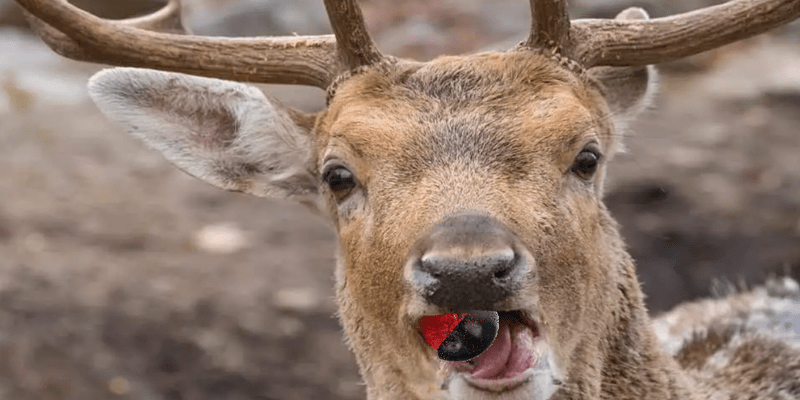
Deer are primarily browsers and prefer to eat woody vegetation such as leaves, twigs, and bark. However, they may also eat fruits when they are in season and available. Plums are a fruit that deer may eat when they are in season and available.
Deer typically eat the fruit of the plum tree, including the flesh and skin, and discard the pit. They may also eat the leaves and twigs of the plum tree. While plums are not a primary food source for deer, they may eat them when other vegetation is scarce or during the fruiting season when they are abundant.
Do Deer Eat Peaches?
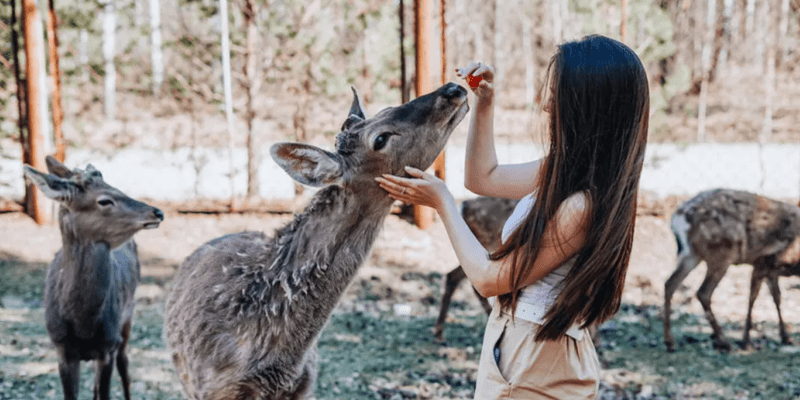
When it comes to peaches, deer will typically eat the fleshy part of the fruit and discard the pit. They may also eat the leaves and twigs of the peach tree. While peaches are not a primary food source for deer, they may eat them when other vegetation is scarce or during the fruiting season when they are abundant.
Do Deer Eat Peach Pits?
Deer sometimes eats peaches, but they don’t usually eat the hard part in the middle called the pit. The pit can make them sick, so they usually just eat the soft, juicy part and leave the pit behind.
However, deer can still cause problems for peach trees. They might bite and scratch the tree, which can make it hard for the tree to grow and make more peaches.
Frequently Ask Question
1. Do deer eat fruits, and if so, which ones are their favorites?
Yes, deer do eat fruits. Their favorites include apples, pears, blackberries, raspberries, and grapes.
2. Why do deer eat fruits, and what nutritional benefits do they provide for them?
Fruits are a source of carbohydrates and nutrients for deer, which are important for their overall health and survival. Fruits can also help provide energy during times of food scarcity.
3. What are some ways that farmers and gardeners can protect their fruit trees from deer damage?
Farmers and gardeners can protect their fruit trees from deer damage by using physical barriers such as fencing or netting. They can also use deer repellents, which can be applied to the tree or sprayed in the surrounding area.
4. Can deer get sick from eating too much fruit, or are there any fruits that are harmful to them?
While deer can eat fruits, they should not rely on them as a primary food source as they are not nutritionally complete. Some fruits can also be harmful to deer if they consume them in large quantities, such as cherries that contain cyanide.
5. Do different types of deer have different preferences when it comes to eating fruits?
There are over 90 species of deer, and different species may have different preferences when it comes to eating fruits. However, there is limited research on this topic, so it’s unclear which specific species prefer certain fruits.
6. How do deer find fruit trees, and do they use any specific strategies for locating them?
Deer may find fruit trees through their sense of smell or by remembering the location of trees they have previously eaten from. They may also use trails or other landmarks to help locate fruit trees.
Leave a Reply